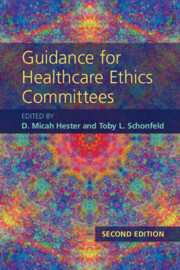Book contents
- Guidance for Healthcare Ethics Committees
- Guidance for Healthcare Ethics Committees
- Copyright page
- Dedication
- Contents
- Contributors
- Preface
- Section 1 The Context of Healthcare Ethics Committee Work
- Section 2 Consultation
- Chapter 7 Ethics Consultation Mission, Vision, Goals, and Process
- Chapter 8 A Method of Consultation
- Chapter 9 Informed Consent
- Chapter 10 Confidentiality and Privacy
- Chapter 11 Decision-Making Capacity
- Chapter 12 Discharge Challenges
- Chapter 13 Surrogate Decision Making
- Chapter 14 Advance Care Planning and End-of-Life Decision-Making
- Chapter 15 Potentially Inappropriate Treatment and Medical Futility
- Chapter 16 Cognitive Dissonance and the Care of Patients with Disorders of Consciousness
- Chapter 17 Ethical Issues in Reproduction
- Chapter 18 Ethical Issues in Neonatology
- Chapter 19 Ethical Issues in Pediatrics
- Chapter 20 Neuroethics
- Chapter 21 Ethical Issues in Clinical Genetics
- Chapter 22 Challenging Issues in Surgical Ethics
- Chapter 23 Psychiatric Ethics
- Section 3 Policy Development and Organizational Issues
- Index
- References
Chapter 9 - Informed Consent
from Section 2 - Consultation
Published online by Cambridge University Press: 17 February 2022
- Guidance for Healthcare Ethics Committees
- Guidance for Healthcare Ethics Committees
- Copyright page
- Dedication
- Contents
- Contributors
- Preface
- Section 1 The Context of Healthcare Ethics Committee Work
- Section 2 Consultation
- Chapter 7 Ethics Consultation Mission, Vision, Goals, and Process
- Chapter 8 A Method of Consultation
- Chapter 9 Informed Consent
- Chapter 10 Confidentiality and Privacy
- Chapter 11 Decision-Making Capacity
- Chapter 12 Discharge Challenges
- Chapter 13 Surrogate Decision Making
- Chapter 14 Advance Care Planning and End-of-Life Decision-Making
- Chapter 15 Potentially Inappropriate Treatment and Medical Futility
- Chapter 16 Cognitive Dissonance and the Care of Patients with Disorders of Consciousness
- Chapter 17 Ethical Issues in Reproduction
- Chapter 18 Ethical Issues in Neonatology
- Chapter 19 Ethical Issues in Pediatrics
- Chapter 20 Neuroethics
- Chapter 21 Ethical Issues in Clinical Genetics
- Chapter 22 Challenging Issues in Surgical Ethics
- Chapter 23 Psychiatric Ethics
- Section 3 Policy Development and Organizational Issues
- Index
- References
Summary
Informed consent has become a standard part of medical practice over the past half-century (Berg et al., 2001). In the twentieth century, at a high point of other movements toward expansion of civil and individual rights, a series of court cases delineated the doctrine of “informed consent” for the first time. Prior to this time, consent, if it existed at all, was based on a concept of a simple consent – disclosure of information was not considered necessary; the patient just had to agree to treatment. In some situations, merely the fact that a patient sought treatment in the first place, along with the fact that they did not leave when treatment was begun, was deemed adequate consent.
- Type
- Chapter
- Information
- Guidance for Healthcare Ethics Committees , pp. 76 - 84Publisher: Cambridge University PressPrint publication year: 2022



